CHAPTER 12
In a grand chamber adorned with intricate carvings and tapestries, the group of esteemed Kurus had gathered. The four men engaged in polite conversation, inquiring about each other's well-being and the affairs of their respective kingdoms. It was a customary exchange, a way to establish rapport and build alliances.
As they spoke, the servants moved quietly around the room, refilling the goblets with cool water and serving delectable delicacies. The atmosphere was one of formality and respect, befitting the stature of the men gathered there.
Soon Hemant entered the room, his steps quiet and deliberate. He bowed respectfully to the assembled men and then approached Dilip, his voice hushed.
"Maharaj," he whispered, "Darshan hetu Maharani ne mana kar diya hai."
Dilip's heart sank, but his expression remained unbroken. He nodded subtly, the weight of the news pressing down on him like a heavy mantle. The Kurus exchanged eager glances, their excitement palpable, unaware of the turmoil beneath.
"Kya hum Ujjayini se ab mil sakte hai ?" Dhritrashtra, his voice filled with anticipation, asked.
Dilip's smile faltered for a fleeting moment, but he quickly masked it with a broader grin. The Kurus eyed him expectantly, while he searched for a reassuring answer amid his swirling thoughts.
"Mila deta kintu Rajkumari abhi so rahi hai." he said, his voice gentle
Dhritrashtra impatiently asked, "Kya aap use jagah nahi sakte ?" he asked, his voice tinged with disappointment.
Vidur placed a gentle hand on Dhritrashtra's arm, stopping him, "Koi baat nahi, Haiheya-Samrat. Hum Akhand Maharani ke vishram mei badha nahi daalna chaahte."
Dhritrashtra sighed, his impatience momentarily quelled. He knew that Vidur was right. It would be disrespectful to wake the princess from her slumber, especially when the princess was a goddess.
"Kisi amulya vastu ko praapt karne ke liye, kabhi kabhi pratiksha karni padti hai." Bhishm said, "Hum bhi shaanti se pratiksha karenge, Maharaj Dilip. Waise bhi dev-darshan hetu pratiksha sab karte hai."
"Satyavachan, Mahamahim." Dilip smiled, his face lighting up with warmth. "Kintu aap humare atithi hai, aapka samaye vyarth nahi karenge hum. Yadi aap sab chaahe toh hum Ujjain ke prasidh Mahakaal mandir jaa darshan kar sakte hai."
Bhishma, Vidur, and Dhritrashtra exchanged glances. The Mahakaal temple was a renowned place of pilgrimage, and they were intrigued by the idea.
"Yeh sarvottam rahega." Bhishma replied.
Dilip nodded, "Mai prasthaan ki sabhi taiyaari karwata hu."
.
.
.
.
.
A magnificent procession of chariots and horsemen wound their way through the streets of Ujjain. At the head of the procession rode Dilip, his grand chariot drawn by a team of powerful horses. Hemant, his trusted charioteer, guided the reins with skill and precision.
Behind Dilip rode Bhishm, his white chariot gleaming in the sunlight. Adhirath, a seasoned charioteer and an esteemed member of the royal family of Anga-desh, drove the chariot with a steady hand.
Following Bhishma was Dhritrashtra, the blind king, his chariot drawn by a team of black horses. Sanjay, his loyal charioteer, navigated along the procession. Behind Dhritrashtra rode Vidur, the wise counselor. His chariot was drawn by a pair of brown horses, their coats gleaming in the sunlight.
The sound of hooves on the cobblestones echoed through the streets, creating a rhythmic symphony that filled the air. The banners and flags of the two kingdoms fluttered proudly in the breeze. The streets were filled with bustling energy, as people went about their daily routines.
Many had come to see Dilip, their emperor. Others were eager to catch a glimpse of Bhishm, the venerable guardian of Hastinapur, whose tales of valor and chivalry had been passed down through generations.
Bhishma's gaze swept across the crowd, his eyes taking in the sights of the city. Ujjain, though ancient, had undergone significant renovations in recent years, enhancing its grandeur and beauty. The city's architecture was a blend of old and new, with ancient temples standing side by side with new buildings.
What truly caught his attention, however, was the opulence of the people. Men and women alike were adorned in gold and precious gems, their attire was a testament to the city's wealth.
Bhishma was particularly surprised to see several young maidens, dressed in little to no garments, their bodies covered with opulent jewelry instead, such as jeweled breast bands and thick kamarbandhs with dangling adornments.
Bhishma knew that women in the northern part of his kingdom, Uttar Kuru, also did not cover their torsos. However, the boldness and confidence of these maidens of Avanti was something different. They seemed to exude a sense of freedom and self-assuredness that was rare in other parts of Aryavart.
What truly impressed Bhishm was the respectful behavior of the men. They seemed to regard the maidens with respect, their eyes filled with a sense of reverence. It was apparent why those women wore such attires comfortably. Indeed, Ujjain was a city that defied expectations.
The procession drew closer to the Mahakaal temple, its ancient spires piercing the sky. As the chariots pulled into the courtyard, a sense of awe filled the air. The temple, bathed in the golden light of the setting sun, seemed to radiate a divine energy.
Dilip, Bhishma, and Vidur stepped down from their chariots, their eyes filled with reverence. Dhritrashtra, supported by Sanjay, followed closely behind. Together, the four kings entered the Mahakaal temple, their footsteps echoing through the ancient halls.
□□□□□□□□□□□□□□□□□□□□□
A/N
While studying fine arts, and history of our sculptures, one thing I noticed was that women didn't usually cover their breasts. And very few of them wore antariya or lower garments. This is especially apparent in the case of Ujjain/Avanti.
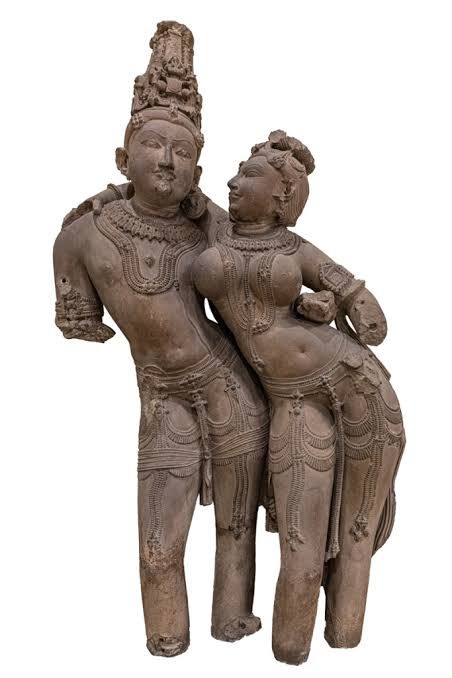
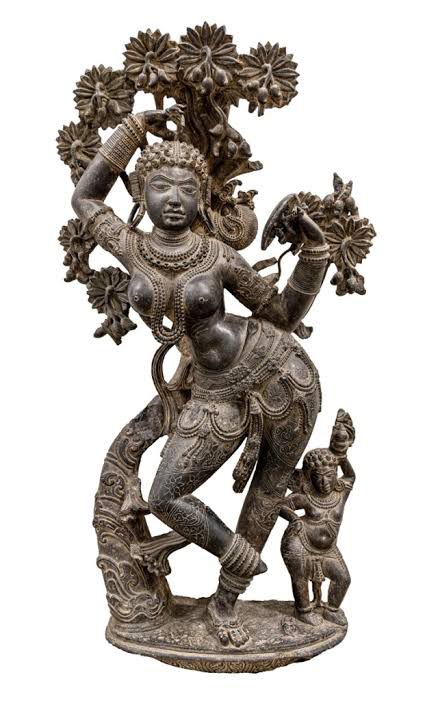
As you can see, it seemed they had designed a thick kamarbandh with such dangling adornments, to cover the lower body.
Breasts usually aren't covered, but sometimes we see a thin band tied across them, often jewelled. Like this -
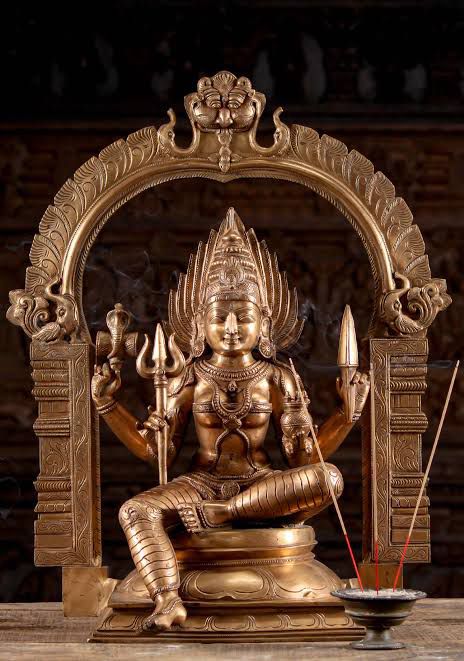
(This is a South Indian idol, btw)
Mahabharat suggests that women used to cover their torsos, they usually wore two garments (much like men) Uttariya to cover breasts and Antariya which was tied around the lower garment. However it is also written, that women in Uttar Kuru didn't cover their upper bodies.
Saree however is not mentioned in Mahabharat. Draupadi, in Dyut Sabha, is shown wearing Uttariya and Antariya only. It's clear when the text says that when she was dragged her upper garments got dishevelled. (Yeah, your whole life was a lie)
Attire also differentiated from region to region, based predominantly on climate and economic status. And to generalise, women of vedic era might've dressed like this -
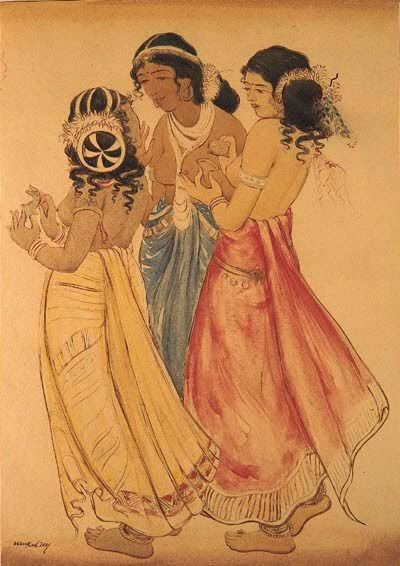
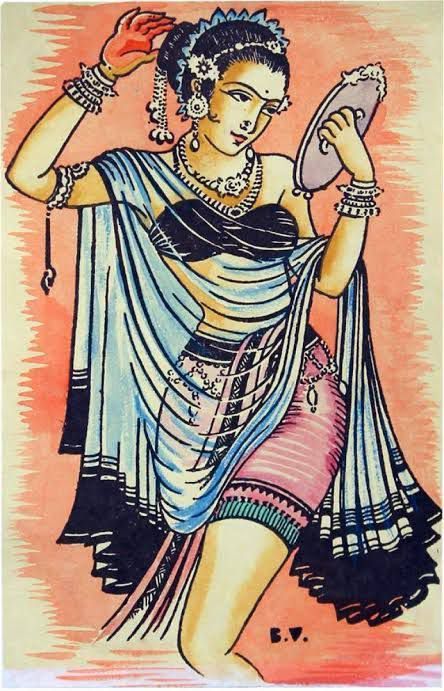
However the women of Ujjain and Avanti region in general were seen covered more in jewellery than in fabrics.
Also I feel like it's a flex-😂
Like oh my kingdom is so rich, we dress in jewels not garments 🤣
Bạn đang đọc truyện trên: AzTruyen.Top